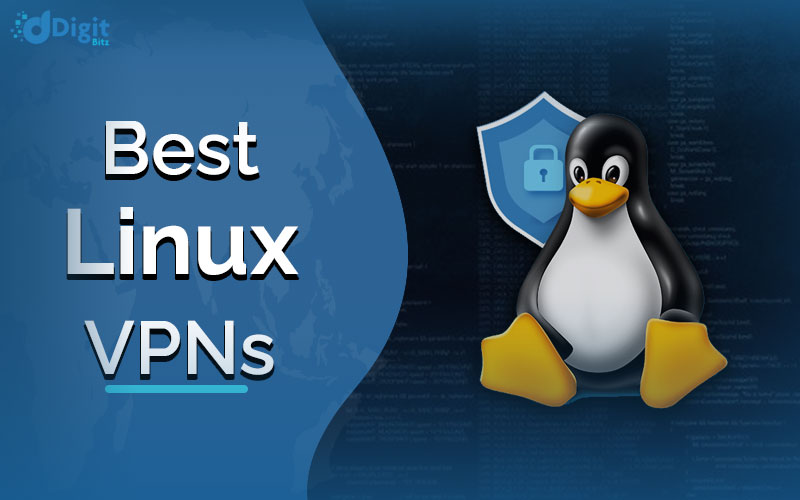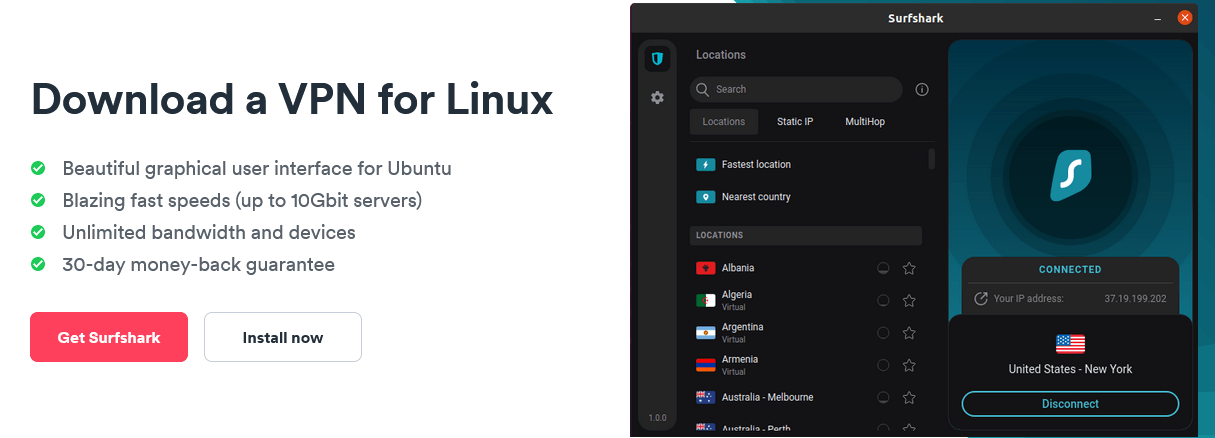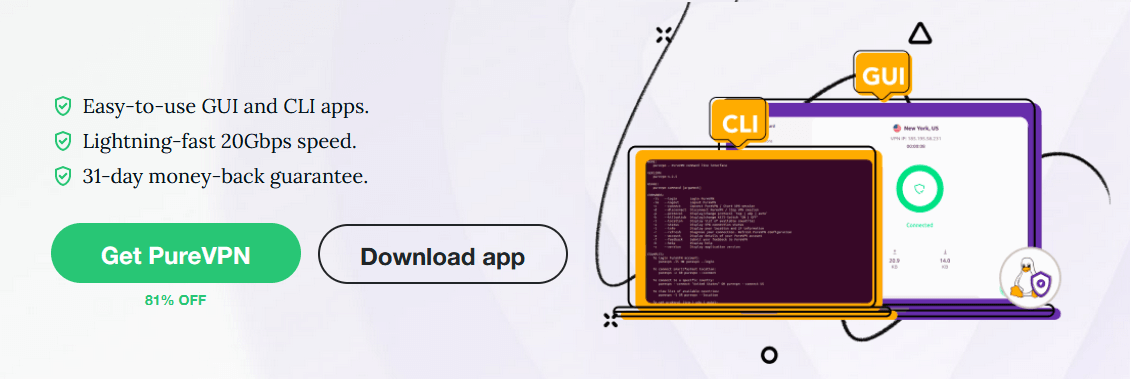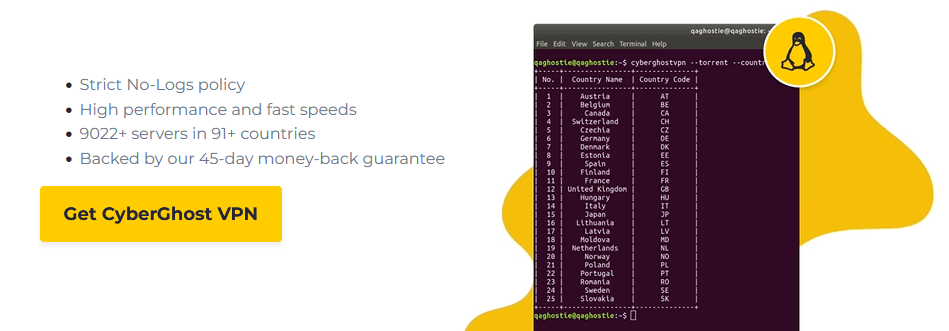Linux is an open operating system that gives you a lot of flexibility. This is the best option for privacy-conscious people because it is open-source in nature.
Finding a reliable and best Linux VPNs, though, can be challenging. Although many of the top VPN providers have been in business for more than ten years, many major companies still don’t provide GUIs for Linux. Even though Linux users are probably habituated to using software without an interface, having a quick and simple button to connect a VPN is still a big achievement for a Linux VPN.
Luckily, there are a few truly outstanding VPN providers who are serious about the Linux industry and develop true Linux applications in conjunction with the rest of the line, including all the major features such as a simple GUI, a kill switch, and the option to change servers easily. Moreover, there are support groups available that have real Linux expertise and can provide assistance when needed.
The following article will introduce you to some of the top Linux VPN providers and describe why they should be your first choice.
Tested and Secure Linux/Ubuntu VPN Apps 2023
- Surfshark: Give Terminal Some Rest with a GUI @ [Surfshark_Price]
- NordVPN: Easily Switch Between the Encryption Protocols @ [NordVPN_Price]
- PureVPN: High Performance and Fast Speeds @ [PureVPN_Price]
- CyberGhost: Keep your Linux Security up to Speed @ [PureVPN_Price]
- IPVanish: You’re on The Way to Total Data Defense @ $3.33/month
How To Install or Setup a VPN For Linux
If you are a full-time Linux user, you should know that there are multiple ways to install an app in Linux, such as VPNs. Your Linux distribution will decide which shape of package you need to install the VPN. Some latest Linux-based operating systems like Ubuntu also offer an app store, from where you can directly install your favorite VPN. If you are new to Linux-based OS, following basic guidelines will assist you in setting up VPN on your Linux PC.
- Firstly, subscribe to a VPN service that is compatible with Linux-based OS.
- Browse the VPN provider’s website and find a suitable installation package for your build.
- Download the package and try opening it first. If nothing happens, you need to use the terminal commands. The instruction to install the package file will be available on the VPN provider’s website. If not, contact its customer support.
Once a package is installed by either method, you can access the app and enable the VPN using terminal command or a GUI, if available.
Do We Really Need a Best Linux VPN?
Comparing Linux to other operating systems, it can’t protect you from all threats, so installing a fastest VPN on your system has a variety of privacy advantages.
When you connect to a VPN, your traffic is routed to the VPN server, for example, before hitting its actual destination (whatever site or resource you’re attempting to access). As a result, your local network and ISP won’t be able to see anything about what you’re doing online or snoop on your data, even when you’re using unreliable public Wi-Fi.
Connectivity Of A VPN To Different Countries
The reliable VPNs have locations in different countries, making them perfect for unblocking content that may be restricted in your nation. A best price VPN can unblock the content you require, whether you’re trying to access uncensored news that your government legitimately doesn’t want you to see or view US Netflix.
So, what do you think? Do you really need a VPN or is Linux security enough for you? If not, keep reading this article till the end to know which VPNs to avoid when your primary operating system is based on Linux.
SurfShark: Apps Comes with a Genuine Graphical User Interface
Surfshark VPN has been widely recognized as the most-budget friendly VPN in the industry. With its super affordable packages, it offers unlimited simultaneous connections on all the supported devices. It means you can enjoy one subscription on your Windows PC, smartphones, routers, and Samsung Smart TV in addition to the Linux-based PC.
To install Surfshark on your Linux machine, you must use either the Ubuntu or Debian distribution with sudo/root rights to configure the client. After finishing, you will see a catalog of cities and countries to connect to. You must use the terminal to connect or disconnect from the servers because there is no GUI available yet.
The major drawback of the Surfshark Linux version is that it only provides OpenVPN in TCP and UDP modes, which is somewhat annoying as the other platform apps have WireGuard that offers maximum speed. Anyhow, the speeds are still pretty decent with these protocols and you won’t suffer much during your daily tasks.
You’ll even get some extra entertainment value because Surfshark is known to enable the majority of streaming services including ViuTV, Iqiyi, Netflix, Hulu, Disney+, and much more.
NordVPN: A Hassle-Free Online Experience For Linux
NordVPN is a top all-rounder VPN service provider, whether you want to use it on Linux, Windows, or even on the router. You can select from their 5500+ servers in 60 different nations, and it guarantees there are no IP leaks. In order to keep their claim of having no logs, all of these servers are only running in RAM.
You can obtain Debian and RPM packages from their official website. These will encompass the most widely used distributions, such as Fedora, Ubuntu, and Linux Mint. There is even a fan-made version of Arch Linux, but you still require a NordVPN subscription to use it. They also provide manual OpenVPN and IKEv2 connection instructions on their support website.
The main drawback that comes after NordVPN is that it doesn’t offer any GUI. Therefore, you have to configure all the parameters of NordVPN using the terminal commands which is a turn-off for basic Linux users.
PureVPN: Easy-to-use GUI and CLI Apps
For Linux OS users, PureVPN is another reliable VPN service which provides a simple setup for your Linux device to maximize your online security, privacy, and data protection, along with GUI support.
Currently, PureVPN is supported on Fedora, Linux Mint, and Ubuntu versions of Linux through a command line interface and has just released a new GUI (Graphical User Interface) build for Ubuntu, making it much simpler to use for basic users.
When it comes to speed, PureVPN didn’t disappoint us. Utilizing its OpenVPN TCP and UDP protocols for Linux, it provided us lag-free gaming and streaming experience, making it the solid choice for users who are not just buying VPN for Linux but also to unblock popular streams.
CyberGhost – The Most Powerful Linux VPN With GUI
The best and 4th VPN for Linux right now on the Position is CyberGhost, one of the best options for Linux OS users thanks to its excellent performance and simple configuration using a dedicated GUI. The supplier claims more than 9000+ servers spread across 90 different countries.
The distributions Linux Mint, Arch, Raspberry Pi OS, Ubuntu, Debian, and Fedora are all compatible with it. You can get a GUI if you prefer; however, a terminal is usually used to control the VPN. To use GUI, simply add the CyberGhost browser extension for Chrome, Firefox, or Edge to get started.
CyberGhost’s exclusive lightway tunneling protocol is its most distinctive feature. The custom-built protocol is small, lightning-fast, and excellent for your device’s battery life. As a result, ExpressVPN is a great option for streaming, torrenting, and game play.
Methodology Behind VPN Selection For Linux Based Systems
Compared to Windows users, Linux is much less popular among common computer users. Linux users have specialized work that can only be performed on Linux-based systems. As a result, they want to customize everything themselves and are very familiar with their system’s operation.
Thus, recommending a reliable VPN service becomes more difficult. While VPNs for Linux are nearly identical to those for other platforms, we focused on the same key areas for Linux as we had for any other platform, but with the inclusion of Linux OS compatibility.
- Linux Compatibility: The most important factor for a Linux VPN is that it supports the VPN functions using the terminal commands. However, GUI is a plus point which can save much of the time in writing commands but if better security is provided without GUI, then it can be a good trade-off.
- Security and Privacy: Security is the most crucial component of any VPN and is achieved by using advanced ciphers and cutting-edge tunneling protocols. A solid Linux VPN should have a variety of security features, including traffic obfuscation, a kill switch, and AES-256 encryption. It should also have a no-log policy, preferably audited by an independent agency.
- Performance: No one likes slow speed, and so do Linux users. Therefore, it is important to select a VPN that offers high speed without affecting your base internet speed by more than 10%,
- Additional Features: In contrast to macOS or Windows applications, Linux app versions typically don’t receive many essential features. But it’s not always the case. Any additional features that can enhance convenience, protection, or both can make a Linux VPN from the ground to the No.1 position.
- Price: Paying for services that aren’t even offered by the applications you intend to use is unfair. If you’re only using a VPN for Linux, pick a provider that offers the most benefits for your preferred operating system.
If you’re searching for a good free VPN service that works with Linux, try ProtonVPN. They don’t have a bandwidth limit and let you pick from a variety of server locations. Above all, the service complies with the core privacy and security standards. They are based in privacy-friendly Switzerland and are supported by contributions from paid users.
For your surprise, the ProtonVPN Linux software also has a simplified graphical user interface, nevertheless it can also be accessed via the terminal. It’s an unbeatable choice if you need a free VPN for Linux, even though the assistance could be a little better if you pay for its subscription.







